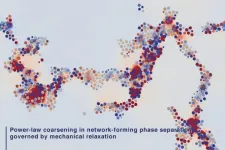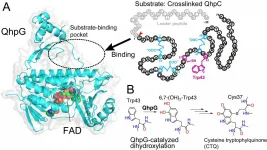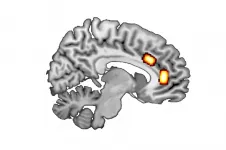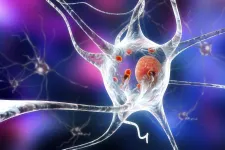Sleep keeps teens on track for good mental health
2021-02-10
(Press-News.org) As families settle back into a new school year, sleep experts at the University of South Australia are reminding parents about the importance of teenagers getting enough sleep, cautioning them that insufficient sleep can negatively affect their mental health.
In a new research paper, UniSA sleep experts Dr Alex Agostini and Dr Stephanie Centofanti confirm that sleep is intrinsically linked to mental health, but is commonly overlooked by health practitioners as a contributing factor.
Dr Agostini says it's imperative that parents and medical practitioners are aware of the bi-directional relationship between sleep and mental health, particularly across the teenage years.
"Getting enough sleep is important for all of us ¬¬- it helps our physical and mental health, boosts our immunity, and ensures we can function well on a daily basis," Dr Agostini¬ says.
"But for teenagers, sleep is especially critical because they're at an age where they're going through a whole range of physical, social, and developmental changes, all of which depend on enough sleep.
"Research shows that teenagers need at least eight hours of sleep each night. Without this, they're less able to deal with stressors, such as bullying or social pressures, and run the risk of developing behavioural problems, as well as anxiety and depression.
"If sleep drops to less than six hours a night, research shows that teens are twice as likely to engage in risky behaviours such as dangerous driving, marijuana, alcohol or tobacco use, risky sexual behaviour, and other aggressive or harmful activities."
In Australia, almost one in seven children and adolescents (aged 4-17 years) will experience a mental health disorder. The World Health Organization says that while half of all mental health conditions start by age 14, most cases go undetected and untreated.
Co-researcher, Dr Centofanti says while many factors contribute to later bedtimes for teenagers, technology is one of the greatest offenders.
"Teens spend a lot of time on devices, whether it's texting friends, playing games, or watching videos, using technology late into the night is one of the most common disruptors of good sleep. Overuse of technology can also contribute to mental health issues likely to increase anxiety," Dr Centofanti says.
"Not only can technology use make us feel anxious and awake, but the blue light emitted from technology inhibits the production of the sleep hormone melatonin to delay the natural onset of sleep. This is problematic because teens already have a biological tendency to want to stay up late and sleep in.
"To make a real difference to teenage mental health, both parents and medical practitioners must understand how sleep can affect mental health in teenagers."
INFORMATION:
Media contact: Annabel Mansfield T: +61 8 8302 0351 M: +61 417 717 504
E: Annabel.Mansfield@unisa.edu.au
Researchers:
Dr Alex Agostini: T: +61 8 8302 2894 E: Alex.Agostini@unisa.edu.au
Dr Stephanie Centofanti T: +61 8 8302 9324 E: Stephanie.Centofanti@unisa.edu.au
[Attachments] See images for this press release:

ELSE PRESS RELEASES FROM THIS DATE:
2021-02-10
For all their importance as a breakthrough treatment, the cancer immunotherapies known as checkpoint inhibitors still only benefit a small minority of patients, perhaps 15 percent across different types of cancer. Moreover, doctors cannot accurately predict which of their patients will respond.
A new study finds that inherited genetic variation plays a role in who is likely to benefit from checkpoint inhibitors, which release the immune system's brakes so it can attack cancer. The study also points to potential new targets that could help even more patients unleash their immune system's natural power to fight ...
2021-02-10
DALLAS, Feb. 10, 2021 — Reducing the prevalence of obesity may prevent up to half of new Type 2 diabetes cases in the United States, according to new research published today in the Journal of the American Heart Association, an open access journal of the American Heart Association. Obesity is a major contributor to diabetes, and the new study suggests more tailored efforts are needed to reduce the incidence of obesity-related diabetes.
Type 2 diabetes is the most common form of diabetes, affecting more than 31 million Americans, according to the U.S. Centers ...
2021-02-10
Researchers at Uppsala University and the Swedish University of Agricultural Sciences have used new methods for DNA sequencing and annotation to build a new, and more complete, dog reference genome. This tool will serve as the foundation for a new era of research, helping scientists to better understand the link between DNA and disease, in dogs and in their human friends. The research is presented in the journal Communications Biology.
The dog has been aiding our understanding of the human genome since both genomes were released in the early 2000s. At that time, a comparison of both genomes, and two others, revealed that the human genome contained circa 20,000 genes, down ...
2021-02-10
Increased level of plasma cells linked to improved cancer survival
1,300 prostate tumor samples studied
Immunotherapy-based precision medicine clinical trials being developed
CHICAGO--- Black men die more often of prostate cancer yet, paradoxically, have greater survival benefits from immunotherapy treatment. A new Northwestern Medicine study discovered the reason appears to be an increase of a surprising type of immune cell in the tumor. The findings could lead to immune-based precision medicine treatment for men of all races with localized aggressive and advanced prostate cancer.
In the new study, Northwestern scientists showed tumors from Black men and men ...
2021-02-10
CHAMPAIGN, Ill. -- When modified using a process known as epoxidation, two naturally occurring lipids are converted into potent agents that target multiple cannabinoid receptors in neurons, interrupting pathways that promote pain and inflammation, researchers report. These modified compounds, called epo-NA5HT and epo-NADA, have much more powerful effects than the molecules from which they are derived, which also regulate pain and inflammation.
Reported in the journal Nature Communications, the study opens a new avenue of research in the effort to find alternatives to potentially addictive opioid pain killers, researchers say.
The ...
2021-02-10
Tokyo, Japan - Researchers from Institute of Industrial Science at The University of Tokyo investigated the mechanism of phase separation into the two phases with very different particle mobilities using computer simulations. They found that slow dynamics of complex connected networks control the rate of demixing, which can assist in the design of new functional porous materials, like lithium-ion batteries.
According to the old adage, oil and water don't mix. If you try to do it anyway, you will see the fascinating process of phase separation, in which the two immiscible liquids spontaneously "demix." In this case, the minority phase always forms droplets. Contrary to this, the researchers ...
2021-02-10
Osaka, Japan - Investigators from the Institute of Scientific and Industrial Research at Osaka University, together with Hiroshima Institute of Technology, have announced the discovery of a new protein that allows an organism to conduct an initial and essential step in converting amino acid residues on a crosslinked polypeptide into an enzyme cofactor. This research may lead to a better understanding of the biochemistry underlying catalysis in cells.
Every living cell is constantly pulsing with an array of biochemical reactions. The rates of these reactions are controlled by special proteins called enzymes, which catalyze specific processes that would otherwise take much longer. A number of enzymes require specialized molecules called "cofactors," which can help shuttle electrons ...
2021-02-10
As indicated by other studies, different parts of the brain are responsible for different types of decisions. A research team led by Luca Franziska Kaiser and Prof. Dr. Gerhard Jocham from the HHU working group 'Biological Psychology of Decision Making', and Dr. Theo Gruendler together with colleagues in Magdeburg analysed the balance of the messenger substances GABA and glutamate in two forms of decision-making. The background to the research was to find out how different concentrations of these substances influence the person making the decision.
On the one hand, the researchers looked at 'reward-based decisions', which involve maximising reward by selecting the better of two ...
2021-02-10
It is now possible to capture images of planets that could potentially sustain life around nearby stars, thanks to advances reported by an international team of astronomers in the journal Nature Communications.
Using a newly developed system for mid-infrared exoplanet imaging, in combination with a very long observation time, the study's authors say they can now use ground-based telescopes to directly capture images of planets about three times the size of Earth within the habitable zones of nearby stars.
Efforts to directly image exoplanets - planets outside our solar system - have been hamstrung by technological limitations, resulting in a bias toward the detection of easier-to-see planets that are much larger than Jupiter and are located around very young stars and far outside the ...
2021-02-10
A study published in Nature Communications today (Wednesday 10 February) presents a compelling new evidence about what a key protein called alpha-synuclein actually does in neurons in the brain.
Dr Giuliana Fusco, Research Fellow at St John's College, University of Cambridge, and lead author of the paper, said: "This study could unlock more information about this debilitating neurodegenerative disorder that can leave people unable to walk and talk. If we want to cure Parkinson's, first we need to understand the function of alpha-synuclein, a protein present in everyone's brains. ...
LAST 30 PRESS RELEASES:
[Press-News.org] Sleep keeps teens on track for good mental health






